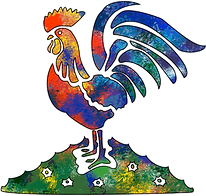Willowbrook Farm – The UK’s First Halal Farm
OUR FARM AT HAMPTON GAY
A History of Farming and Rebellion
Early settlement in the UK
Willowbrook Farm is only the latest iteration of the farming history of Hampton Gay. The transition from hunter gatherer to settled farming appears to have occurred in the UK in the Neolithic period, some 6,000 years ago. This change was driven by the inward migration of both peoples and farming techniques from modern day Turkey and Greece whose cultural practices and indeed DNA, soon overwhelmed that of the hunter gatherer inhabitants.
Evidence from pollen sequencing and archaeological finds (of early farming tools) indicate that rearing cattle and growing cereals such as wheat and barley became increasingly common in the region from this time.
The earliest evidence of settlement in Hampton Gay dates back to the 10th century. From this time there has been a continuous presence of a farming community on our land. In addition to the farmers, utilising ‘common land’, various overlords received “royal favour” and established themselves in Hampton Gay. With force and the support of the monarchy they were able to demand tithes (or taxes) from the village community. By the 11th Century the village had its own church (St Giles) and by the 13th Century a water mill was constructed to grind local grain.
The image shown is the St. Giles’ parish church – by Motacilla
The peasants are revolting!
Hampton Gay thrived until the 15th Century when the number of households dwindled to ten. A wealthy wool merchant bought the Manor in 1544 and set about dispossessing the farming population of their lands. Across the UK this state sanctioned land theft was known as the enclosures, anyone who resisted could be punished and even put to death. One resident from Hampton Gay, Bartholomew Steer, organised an uprising against the harsh use of force to steal their lands. He called on other villagers to meet secretly at night and they plotted to march on the manor and assassinate the lord. From there they hoped to march to London, recruiting other farmers en route, to precipitate a general uprising and overthrow the ruling cliques.
Sadly the rebels were betrayed and arrested. Their leaders were marched on foot to London where they were put on trial in a kangaroo court and sentenced to death, the judge was linked by family connection to the ‘lord’ at Hampton Gay. They were brought back to Oxfordshire and publicly executed two fields away from our farm at Hampton Gay, at a site still known as Enslow Hill.
It’s very possible that the Hampton Gay uprising could have been planned on the very land we farm today and that rebellious spirit, striving for social justice, still resides in the soil of the land. We honour the sacrifice of our farming ancestors.
The image shown is the neglected ruin of Hampton Gay Manor – by Motacilla
